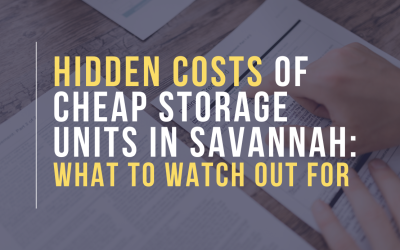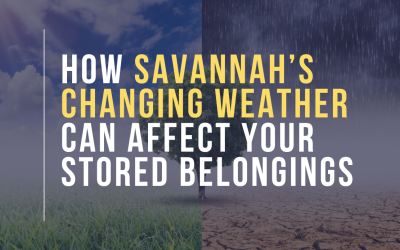Do I Need Insurance for a Stored Vehicle?
You’ve found the perfect storage space for your car, boat, or RV — a safe, secure spot out of the elements. But then it hits you: Do I still need insurance for a stored vehicle?
It’s a common question for anyone looking to save a few dollars while keeping their ride safe. The answer, though, isn’t as simple as yes or no — it depends on where and how your vehicle is stored, and what kind of protection you want to have if something unexpected happens.

Understanding the Smart Way to Protect Your Car, Boat, or RV in Storage
Even when a vehicle isn’t on the road, it’s still vulnerable to risk.
Think: theft, fire, flooding, falling debris, or even accidental damage from another vehicle in the storage facility. Standard auto policies often reduce coverage when a car is “off the road,” but dropping insurance entirely can leave you exposed — financially and legally.
If you’re storing your vehicle in a Savannah storage facility, like Savannah Storage Units, you’re already making a smart move. Our enclosed and outdoor spaces are secure, monitored, and ideal for long-term storage of cars, trucks, boats, and RVs. But insurance adds a critical extra layer of peace of mind.
Real Risks to Stored Belongings
For those placing valuable or sensitive items in storage, the consequences can be serious. Wooden furniture, left unchecked, may split or develop mold, while upholstered pieces can become musty and unusable. Electronics, when exposed to high humidity, might develop internal condensation that leads to corrosion and eventual malfunction. Artwork, photographs, and important documents are especially at risk, since both paper and canvas eagerly absorb moisture and degrade in fluctuating environments. Even musical instruments and off-season clothing, which many people mistakenly believe are safe in any storage unit, often suffer damage ranging from warped wood to moldy fabrics.
How to Protect Your Possessions
Savannah residents who want to safeguard their belongings should insist on climate-controlled storage units, which are specifically designed to counteract the region’s extreme shifts in temperature and humidity. These advanced spaces maintain stable conditions—typically between 55 and 80 degrees Fahrenheit—and also control the humidity that would otherwise threaten delicate possessions.
For added protection, proper packing is essential: sturdy, moisture-resistant containers offer a much better shield against the elements than standard cardboard boxes, while desiccant packs or silica gel help absorb residual dampness. Raising stored items off the ground is another simple but effective precaution, especially during storm season, to avoid the worst effects of flooding and improve overall air circulation. Visiting the storage unit periodically is also highly recommended; even in the best facilities, early intervention is the surest way to prevent permanent damage.
Ultimately, Savannah’s climate calls for more than just a lock and a door. Choosing a reputable storage facility with pest management, vigilant security, and top-notch climate control is the best investment for anyone needing reliable, long-term protection of their valued possessions. With careful preparation and the right environment, it’s possible to overcome the challenges posed by local weather and enjoy true peace of mind, knowing that treasured belongings are safe year-round.
Here’s the breakdown:
-
Comprehensive Coverage Is Key.
Ask your insurance company about a “storage insurance” or “comprehensive-only” policy. It typically protects against non-driving risks like theft, vandalism, or storm damage — all without paying for liability coverage you don’t need when the vehicle isn’t being driven. -
Facility Security Helps, Too.
A reputable storage facility with gated access, surveillance cameras, and controlled entry (like ours here in Savannah) reduces risk — which may even help lower your insurance premiums. -
Your Lender Might Require It.
If your vehicle is financed or leased, your lender probably requires continuous comprehensive coverage, even when it’s not being used. -
Homeowner’s Policies Don’t Always Cover Vehicles.
Many people assume their homeowner’s or renter’s policy will protect a vehicle in storage — but most exclude motor vehicles, RVs, and boats.
Keeping minimal coverage in place ensures that if lightning strikes, a tree falls, or an unexpected break-in occurs, you won’t be left paying for costly repairs or loss out of pocket.

Check out our other recent blogs:
6 Tips for Storing Your Holiday Decorations for Next Year
Storing Holiday Decorations Christmas is...
Hidden Costs of Cheap Storage Units in Savannah—What to Watch Out For
Hidden Cost of Cheap Storage Hidden costs are...
How Savannah’s Changing Weather Can Affect Your Stored Belongings
The changeable Savannah weather is both a point...



